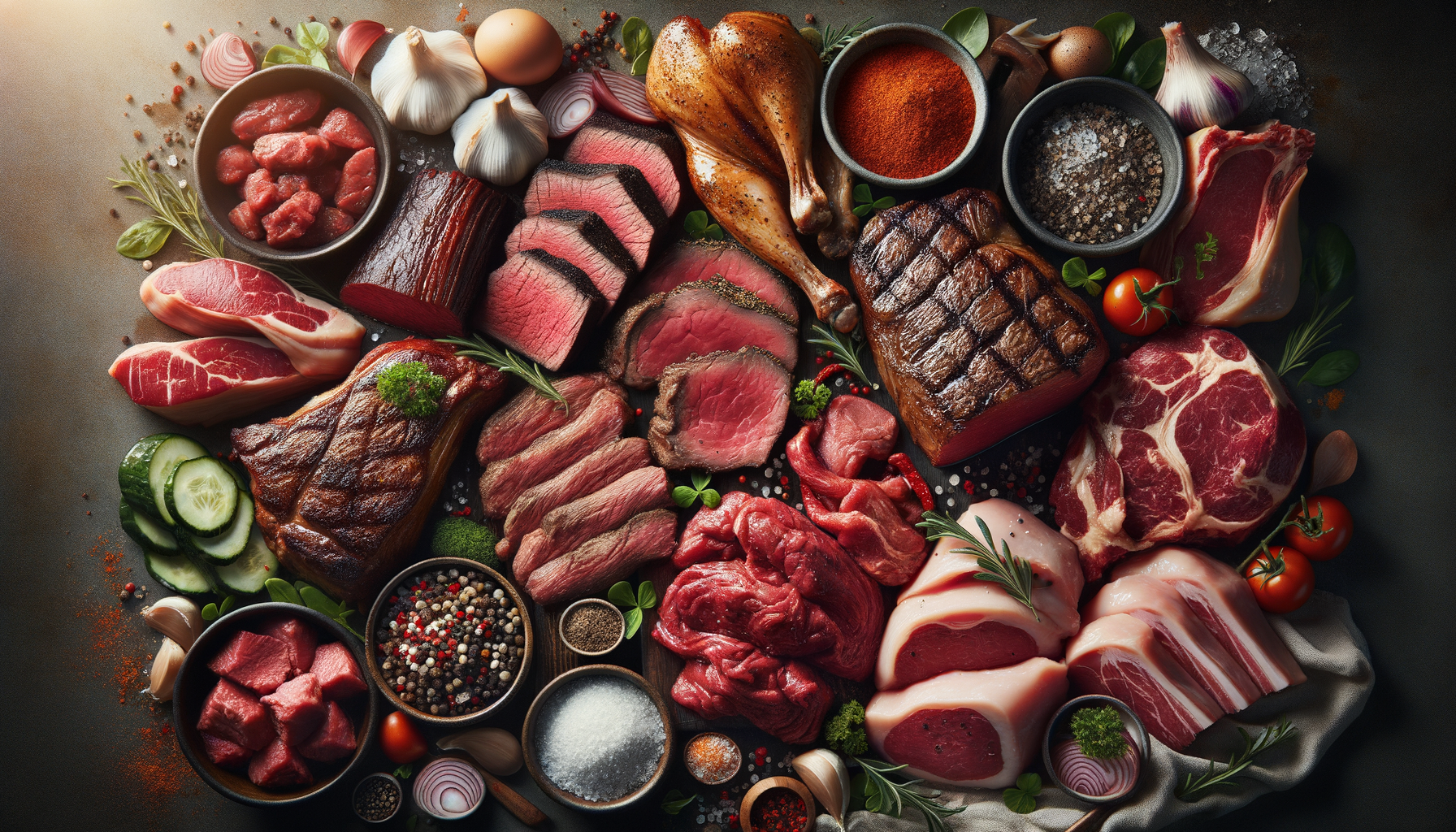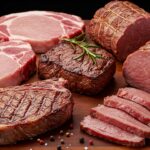Welcome to Meat Only Living! If you’re exploring the carnivore diet, you’re likely drawn to its simplicity and the promise of improved health. But what happens inside your body when you switch to an all-meat diet? This deep-dive explores the intricacies of carnivore digestion, helps you troubleshoot common digestive problems, and provides strategies for nutrient optimization.
Understanding Carnivore Digestion: How it Differs from Other Diets
The carnivore diet, at its core, is about eliminating plant matter and focusing solely on animal products. This fundamental shift has profound effects on your digestive system.
The Simplicity of Protein and Fat Digestion
Digesting protein and fat, the primary macronutrients in meat, involves a relatively straightforward process. Proteins are broken down into amino acids, and fats are broken down into fatty acids and glycerol. These components are then absorbed into the bloodstream.
For some individuals, protein and fat can be easier to digest than plant matter. Plants contain fiber and various antinutrients (like phytates, lectins, and oxalates) that can interfere with digestion and nutrient absorption. These substances can bind to minerals, inhibit enzyme activity, and irritate the gut lining in sensitive individuals. The absence of these compounds on a carnivore diet is often cited as a reason for improved digestion.
The Role of Stomach Acid (Hydrochloric Acid – HCL)
Hydrochloric acid (HCL) is the cornerstone of protein digestion. It plays a crucial role in denaturing proteins – unfolding their complex structures to make them accessible to digestive enzymes. This process is essential for effective meat absorption.
Sufficient HCL is absolutely vital for breaking down meat. Without it, large protein molecules can pass through the digestive tract undigested, potentially leading to digestive discomfort and reduced nutrient uptake.
Signs of low stomach acid (hypochlorhydria) include:
- Bloating and gas, especially after meals
- Heartburn or acid reflux (paradoxically, low stomach acid can weaken the lower esophageal sphincter)
- Undigested food in stool
- Feeling full quickly
- Nausea after taking supplements
Bile Production and Fat Digestion
The liver produces bile, a greenish-yellow fluid stored in the gallbladder. Bile’s primary role is to emulsify fats – breaking them down into smaller droplets that can be more easily acted upon by digestive enzymes (lipases) from the pancreas.
On the carnivore diet, your fat intake is typically higher than on a standard diet. This increased fat intake stimulates bile production. If your body is not yet adapted to producing sufficient bile, you might experience temporary digestive issues, such as diarrhea.
The Gut Microbiome’s Adaptation
Switching from a plant-based diet to a meat-based diet dramatically alters the composition of your gut microbiome. The bacteria that thrive on plant fibers will diminish, while those that prefer protein and fat will proliferate.
This transition can lead to a die-off period, where the declining bacteria release toxins, potentially causing temporary digestive issues like bloating, gas, or changes in bowel movements. This is often a short-term adjustment phase.
The long-term stability of a carnivore-adapted microbiome is still being researched, but anecdotal evidence suggests that it can become stable and support healthy digestion. The (potential) long-term stability will be discussed later.
Common Digestive Issues on the Carnivore Diet: Troubleshooting Digestion
While many people experience improved digestion on the carnivore diet, some encounter initial challenges. Here’s how to troubleshoot common problems:
Diarrhea: Causes and Solutions
Diarrhea is a common initial complaint. Possible causes include:
- Excessive fat intake: Your body may not be producing enough bile to handle a sudden increase in fat, especially if you were previously on a low-fat diet.
- Rapid gut microbiome changes: The die-off period can disrupt bowel function.
- Lack of adaptation to high fat: It takes time for your digestive system to adjust.
Troubleshooting digestion:
- Gradually increase your fat intake over several days or weeks.
- Start with leaner cuts of meat and add fat slowly.
- Ensure adequate hydration.
Constipation: Causes and Solutions
Constipation is another potential issue, although less common than diarrhea.
- It’s a myth that fiber is required for bowel movements. While fiber adds bulk, it’s not essential for healthy elimination.
- Dehydration is a major culprit. Meat has a lower water content than many plant foods, so you need to consciously increase your fluid intake.
- Electrolyte imbalances, particularly low magnesium and potassium, can contribute to constipation.
- Underlying issues like hypothyroidism can also slow down bowel motility.
Troubleshooting digestion:
- Drink plenty of water throughout the day.
- Supplement with electrolytes, especially magnesium (magnesium citrate can be particularly helpful for constipation).
- Consider adding bone broth to your diet for hydration and minerals.
- If constipation persists, consult a healthcare professional to rule out underlying conditions.
Bloating and Gas
Bloating and gas can occur for several reasons:
- Eating too much fat too soon.
- Eating too quickly or swallowing air while eating.
- Potential food sensitivities, even to certain types of meat (e.g., some people react to pork or chicken).
- SIBO (Small Intestinal Bacterial Overgrowth), as a pre-existing condition, can be exacerbated by any dietary change, including the carnivore diet.
- Stress significantly impacts digestion.
Addressing these issues requires a holistic approach. Mindful eating, stress management, and potentially identifying food sensitivities are crucial.
Heartburn and Acid Reflux
Interestingly, heartburn often improves on the carnivore diet because the elimination of carbohydrates can reduce pressure on the lower esophageal sphincter (LES). However, some people experience a temporary worsening.
- Low stomach acid can paradoxically weaken the LES, allowing stomach contents to reflux into the esophagus.
- Eating large meals too close to bedtime can also contribute to reflux.
Troubleshooting digestion:
- Eat smaller, more frequent meals.
- Avoid eating within 2-3 hours of bedtime.
- In cases of suspected low stomach acid, Betaine HCL supplementation may be helpful, but always under the guidance of a healthcare professional. It’s crucial to determine the root cause of your reflux before self-treating.
Optimizing Nutrient Absorption from Meat: Nutrient Optimization Strategies
Getting the most out of your carnivore diet involves more than just eating meat. Here’s how to optimize nutrient absorption:
Choosing the Right Cuts of Meat
Variety is key to a well-rounded carnivore diet.
- Organ meats: Liver, kidney, and heart are nutritional powerhouses, packed with vitamins, minerals, and unique compounds not found in muscle meat.
- Fatty cuts vs. lean cuts: Find the right balance for your digestion. Some people thrive on very fatty cuts, while others do better with a mix of lean and fatty.
- Bone broth: A rich source of collagen, gelatin, and minerals, supporting gut health and joint function.
- Variety is important for a broader nutrient profile. Do not only eat ribeye, incorporate other cuts.
Proper Cooking Methods
How you cook your meat can impact its digestibility.
- Avoid overcooking, which can make protein tougher to break down.
- Rare to medium-rare cooking is often preferred for optimal meat absorption (when safe and appropriate, depending on the meat source and quality).
- Slow cooking methods like stewing and braising are excellent for breaking down tougher cuts of meat, making them more tender and easier to digest.
Meal Timing and Frequency
Experiment to find what works best for you.
- Some people thrive on one meal a day (OMAD), while others prefer two or three smaller meals.
- Listen to your hunger cues. Don’t force yourself to eat if you’re not hungry.
- Avoid distractions while eating. Practice mindful eating, chewing your food thoroughly, and savoring each bite. This aids digestion and helps you feel more satisfied.
Hydration and Electrolytes
Water is essential for all bodily functions, including digestion and nutrient transport.
- Drink plenty of water throughout the day.
- Electrolyte balance (sodium, potassium, magnesium) is crucial for optimal carnivore digestion and overall health.
- Good sources of electrolytes include bone broth, unrefined sea salt, and electrolyte supplements.
Digestive Enzymes and Supplements (With Caution)
Supplements can be helpful tools, but they shouldn’t be used as a crutch. Addressing the underlying cause of digestive issues is always the priority.
- Betaine HCL: May be helpful for low stomach acid, but only under the guidance of a healthcare professional.
- Ox bile: Can support fat digestion if your body isn’t producing enough bile.
- Pancreatic enzymes: Rarely needed on a carnivore diet, but a potential option in specific cases (e.g., pancreatic insufficiency).
Importance of Stress Management on Digestion
- High cortisol levels (from chronic stress) can negatively impact digestion, slowing down motility and reducing stomach acid production.
- Techniques to improve stress response: Meditation, deep breathing exercises, yoga, spending time in nature.
- Improving Sleep Quality: Aim for 7-9 hours of quality sleep per night. Sleep deprivation increases cortisol and disrupts gut function.
Long-Term Gut Health on the Carnivore Diet
What about the long-term effects of an all-meat diet on gut health?
Addressing Concerns about Gut Diversity
A common concern is that the carnivore diet lacks fiber, which is often touted as essential for gut diversity. However, it’s important to distinguish between diversity and optimal function.
- While a carnivore diet may lead to a less diverse microbiome, it can still be a stable and healthy one, specialized for processing animal products.
- More research is needed to fully understand the long-term effects of the carnivore diet on the gut microbiome.
Potential Benefits for Gut-Related Conditions
Many people report significant improvements in gut-related conditions like irritable bowel syndrome (IBS), Crohn’s disease, and ulcerative colitis on the carnivore diet.
- Anecdotal evidence and some emerging research suggest that eliminating common gut irritants (grains, legumes, nightshades, etc.) can reduce inflammation and improve symptoms.
- The carnivore diet eliminates many of the foods that commonly trigger digestive distress.
- It’s crucial to work with a healthcare professional if you have any underlying gut conditions. The carnivore diet should not be used as a substitute for medical treatment.
Monitoring Your Body and Making Adjustments
The carnivore diet is not a one-size-fits-all approach. Pay close attention to your body’s signals.
- Keep a food journal to track your digestive responses to different types of meat, cooking methods, and meal timing.
- Listen to your body. If you experience persistent digestive issues, don’t hesitate to make adjustments.
- Be willing to experiment and find what works best for you.
- Schedule regular check-ups with your doctor for lab testing to monitor your overall health and nutrient status.
Frequently Asked Questions (FAQ)
Can I eat fruit on the carnivore diet?
The traditional carnivore diet excludes all plant foods, including fruit. Some people incorporate small amounts of low-sugar fruits (like berries) in a modified version, but this is not considered a strict carnivore approach.
How much water should I drink on the carnivore diet?
Drink to thirst. Aim for enough water so that your urine is pale yellow. You may need to drink more than you did on a standard diet, especially initially.
Will I be deficient in nutrients on the carnivore diet?
A well-planned carnivore diet that includes a variety of animal products, especially organ meats, can provide all the essential nutrients. However, it’s wise to monitor your nutrient status through regular blood tests.
Is the carnivore diet safe for people with diabetes?
Many people with diabetes report improved blood sugar control on the carnivore diet. However, it’s crucial to work closely with your doctor to monitor your blood sugar levels and adjust medications as needed.
How long does it take to adapt to the carnivore diet?
The adaptation period varies from person to person. Some people feel great within a few days, while others may experience digestive adjustments for several weeks. Be patient and persistent.
Conclusion
The carnivore diet offers a unique approach to eating, and its effects on digestion can be profound. By understanding the digestive process, troubleshooting digestion problems, and implementing strategies for nutrient optimization, you can maximize the benefits of this way of eating. Key benefits include potential improvements in gut health, reduced inflammation, and enhanced nutrient absorption due to the elimination of antinutrients and the focus on highly bioavailable nutrients from animal sources. Remember to listen to your body, be patient, and work with a healthcare professional if needed.


